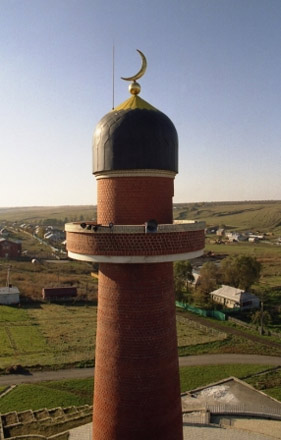Azerbaijan, Baku, Dec. 1 / Trend U. Sadikhova /
A result of referendum in Switzerland banning the construction of minarets will slow the integration of Muslims into Europe and lead to tensions with Muslim countries, a European Middle East analyst said yesterday.
"The Swiss referendum's result certainly does not represent a step forward on the path to the integration of Muslims in Europe," Chiara Sulmoni wrote Trend in an e-mail. Sulmoni works as an analyst at the Geneva- based Center for the Study and Research of Arab Countries and the Mediterranean Basin.
"On the contrary, it deals a blow to a community which in Switzerland represents about five percent of the total population, is generally well-assimilated, unconspicuous, and diverse, she said.
Following a highly controversial campaign based on stereotypes and targeting minarets as symbols of political conquest, expectations for the vote were high. But the Swiss unexpectedly gave in to projected fears of radicalism and political Islam, which are becoming increasingly common in the rest of Europe, Sulmoni believes.
On Sunday the Swiss population supported a ban on building minarets on the territory of the confederacy in a general referendum.
The majority of the votes of the 59 percent of the population that participated in the referendum supported the Swiss People's Party (SVP), known for its nationalist slogans and hope to prohibit the construction of minarets in the country.
SVP representatives see the minarets not as religious, but rather as political symbol and calls on avoiding the "Islamization" of the country, while the Swiss government and parliament also opposed the referendum, RIA Novosti wrote.
According to Sulmoni, the Swiss government did not consider a ban on building minarets as a method of combating extremism, the proliferation of which frightens the Swiss population.
"By encouraging islamophobic tendencies in Europe [a fear of Islam in the West], it might on the contrary achieve the opposite result, heightening and exacerbating a sense of exclusion and discrimination", the expert said, adding that it will also affect future Muslim generations in Europe who will feel rejected by local religious communities.
According to various estimates, about 350,000-400,000 Muslims, mostly immigrants from Turkey and the Balkan countries, live in Switzerland, whose population is about 7.7 million people.
Opponents of the ban believe such action is contrary to the principles of freedom of religion and constitutes discrimination on racial and religious lines, RIA Novosti wrote.
Switzerland also fears the reduction of rich Gulf Arab countries' investments.
Given Switzerland's traditional mediating role in the Middle East, tensions with the Muslim world on a political and economic level are now expected to increase. Some countries might ask the Swiss government to clarify its position vis-a-vis the referendum in the same way that the Organization of the Islamic Conference (OIC) did previously.
"In order to preserve amicable diplomatic relations, it is paramount to explain that the Swiss establishment - the government, most political parties, economic circles, and also part of the population - are not supportive of a ban which does not however infringe upon Swiss Muslims' religious rights in any way, the expert said, pointing out that it is equally important to underscore hat in line with its system of direct democracy.
"Swiss political institutions must act according to the will of the people and take its fears into consideration. To maintain friendly diplomatic relations, it is necessary to convince the world that the government and political establishment of Switzerland, most political parties and economic interests are against the ban," Sulmoni said.
Given the Muslim population and Turkey's potential accession into the EU, it is paramount for Europe to find ways to peacefully accomodate Islam, she said.
Controversy over minarets in Switzerland and the issue of headscarves in France are a pretext for further discussions on the rights of Muslims in Western societies. However, due to the fact that the Muslim community in Switzerland is not well-organized, there will be political tensions between the supporters of the ban and its opponents, Sulmoni said.
However, individuals or parties can still independently appeal to the European Court of Human Rights. The Swiss government will be obliged to take seriously the issue of confrontation in Swiss society, the analyst said.
The referendum in Switzerland has also led to an outbreak of acts of vandalism against mosques. After unknown individuals threw stones at a mosque in early November, a mosque entrance was desecrated by pink paint three days before the referendum.
Do you have any feedback? Contact our journalist at: [email protected]






